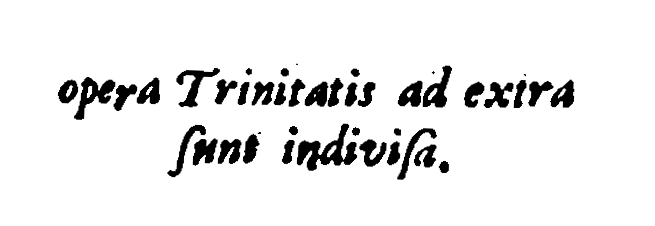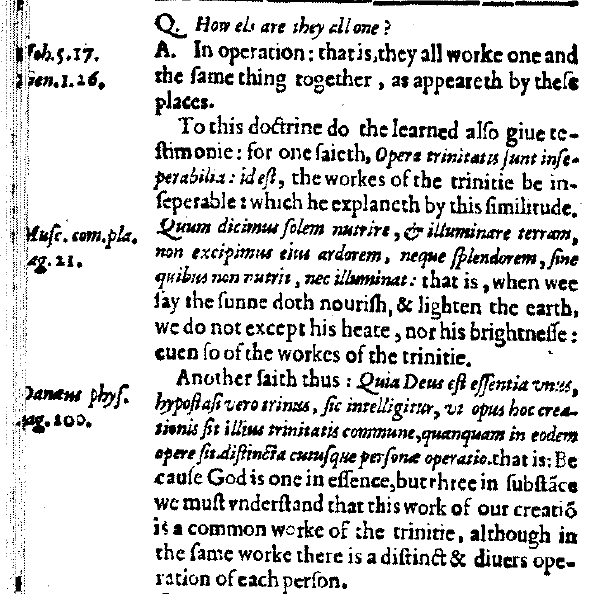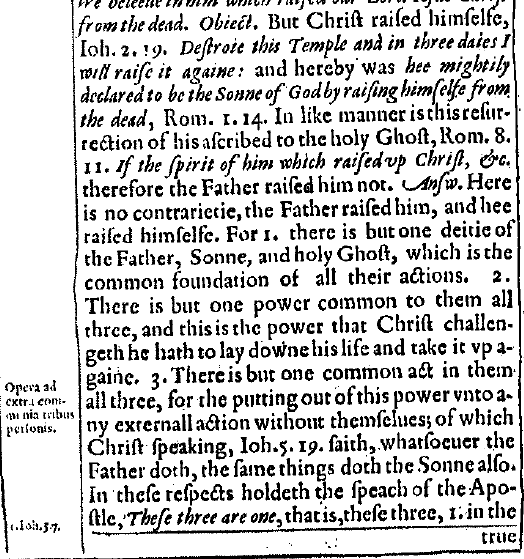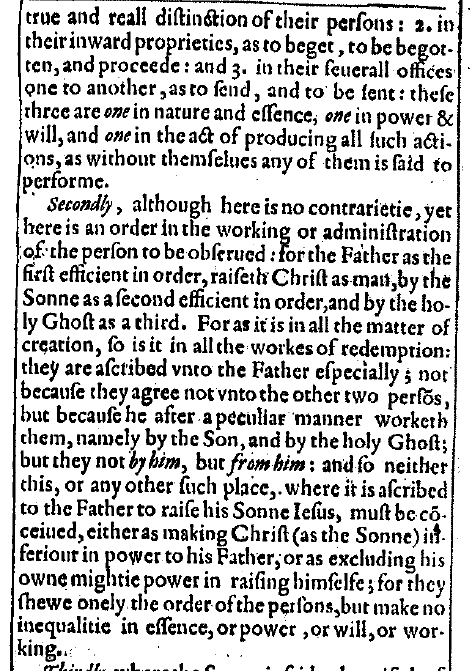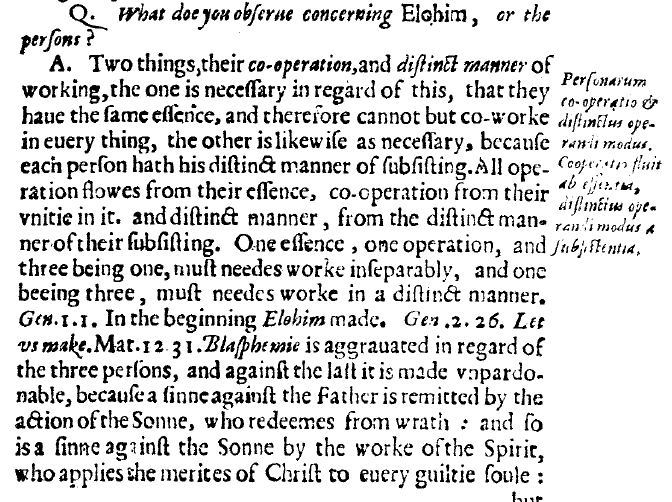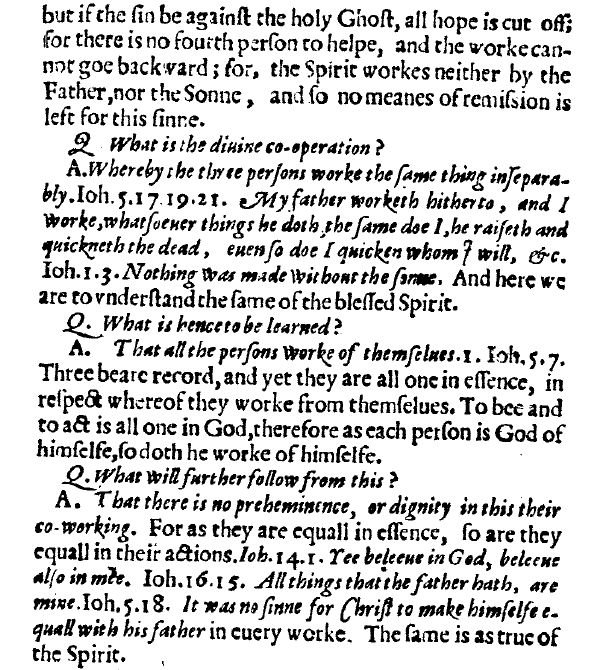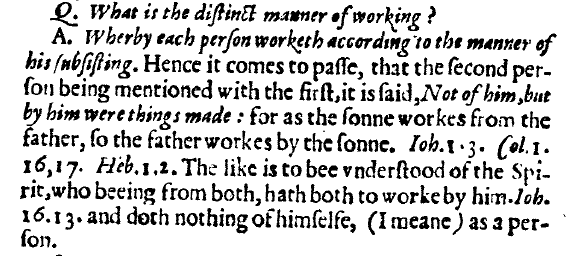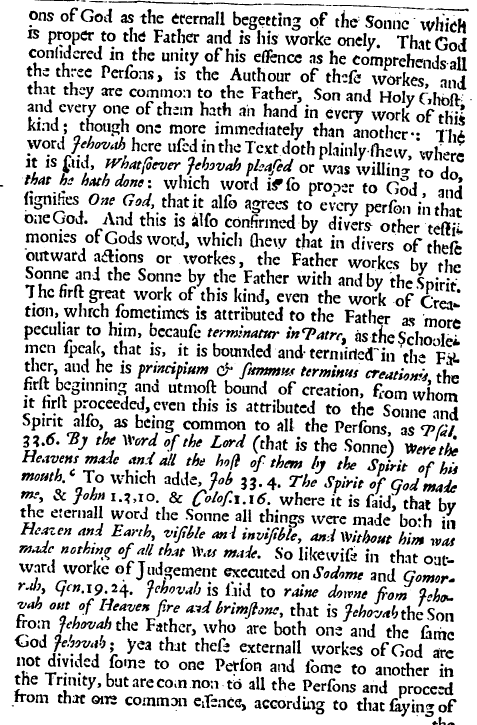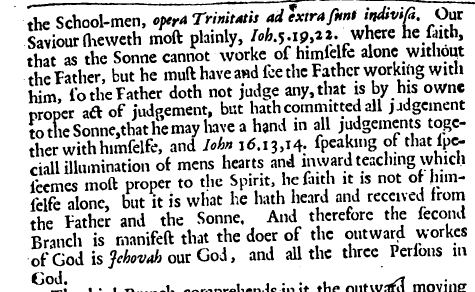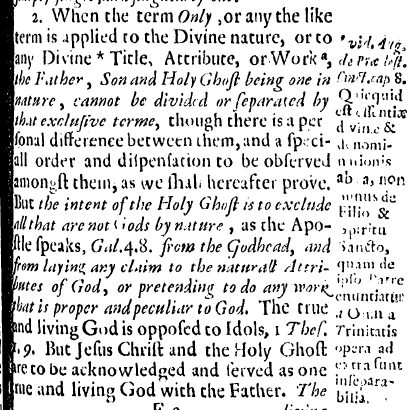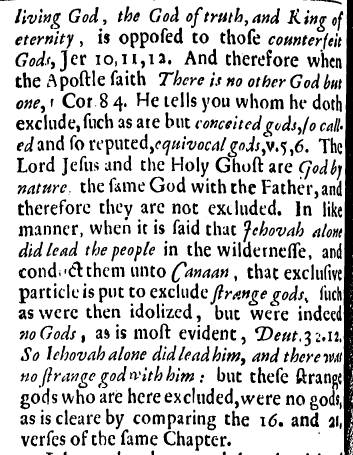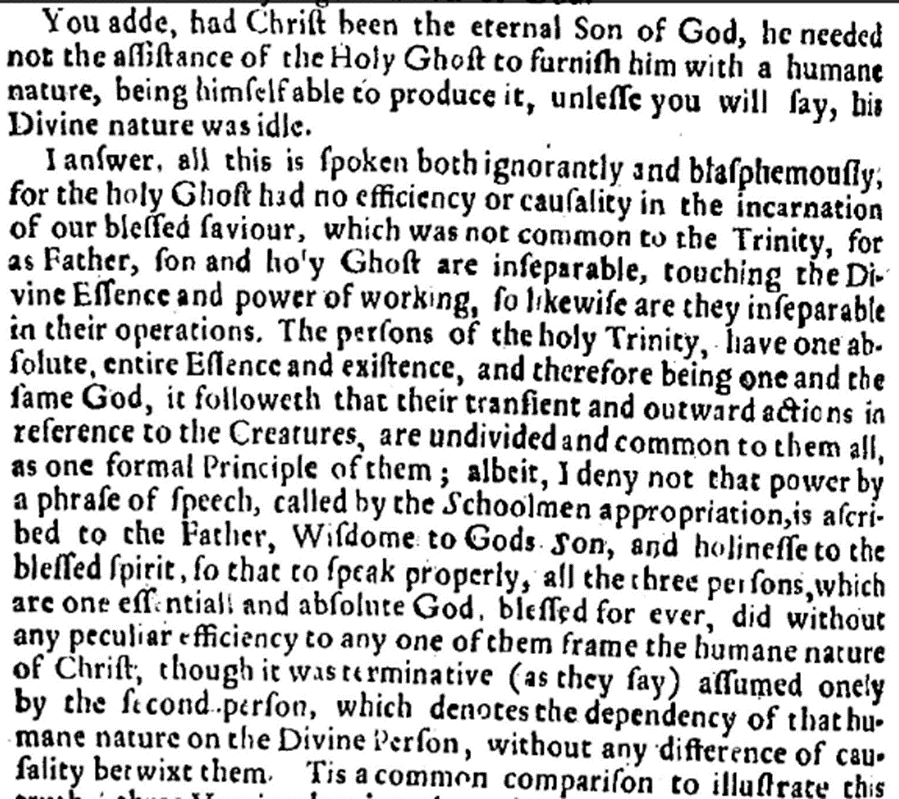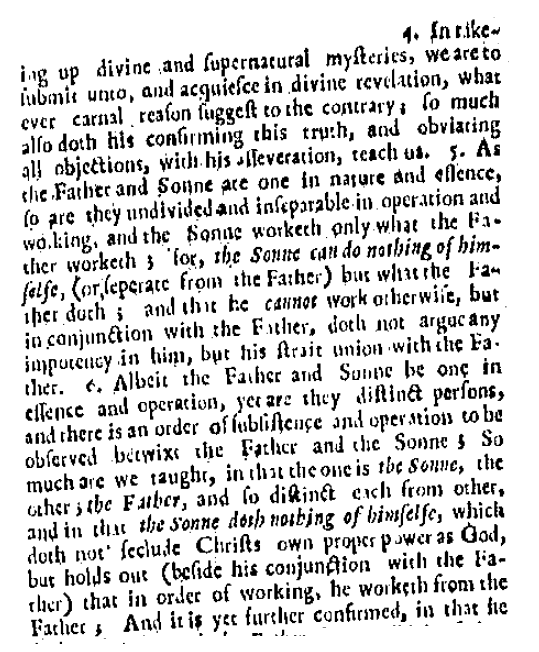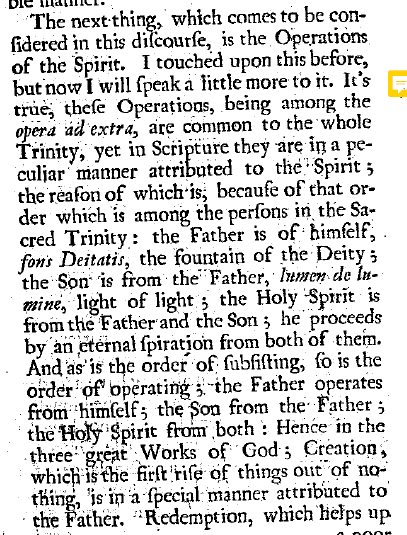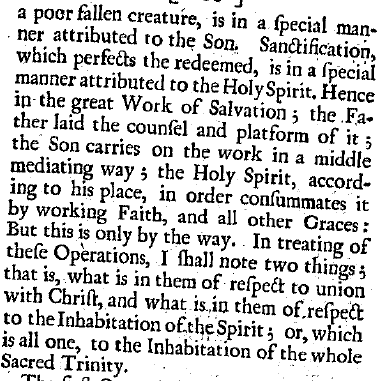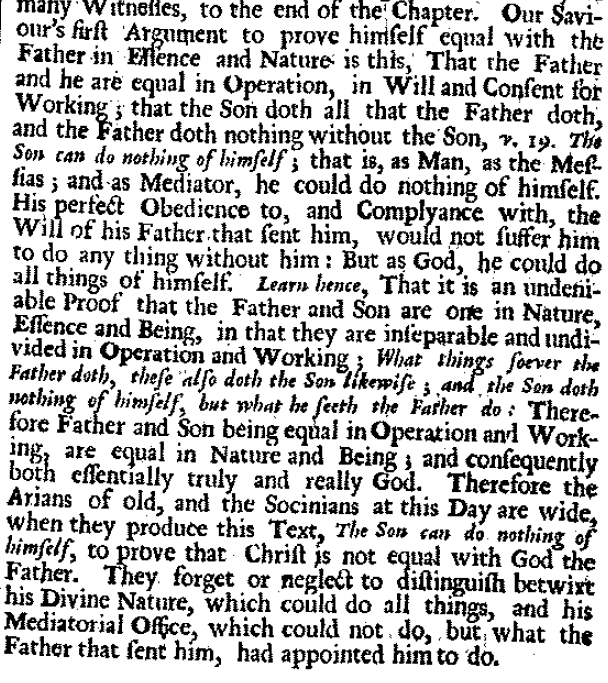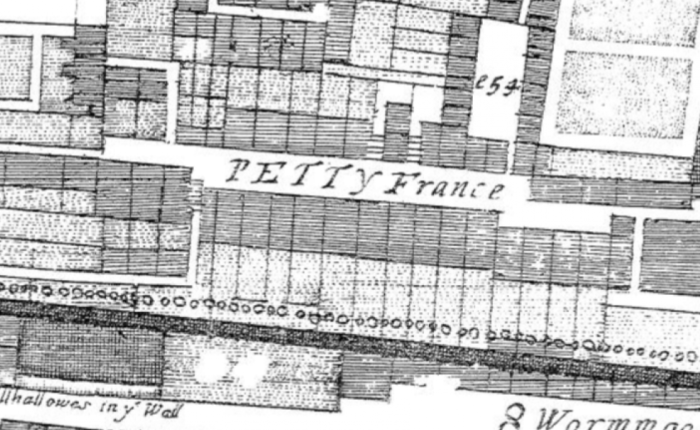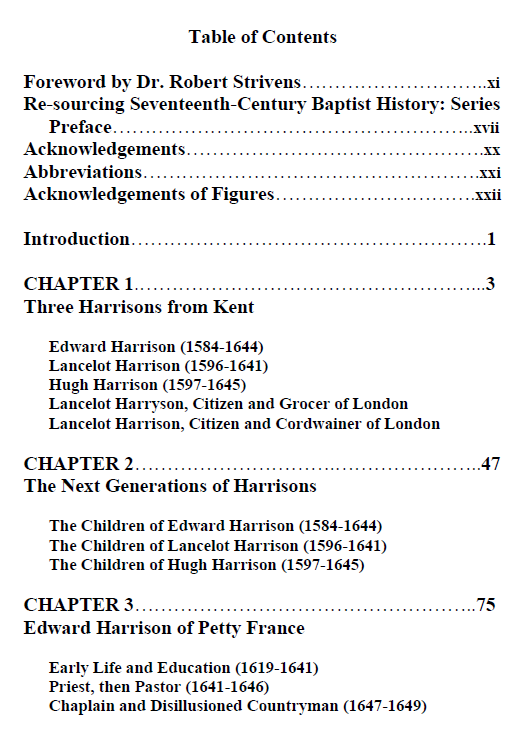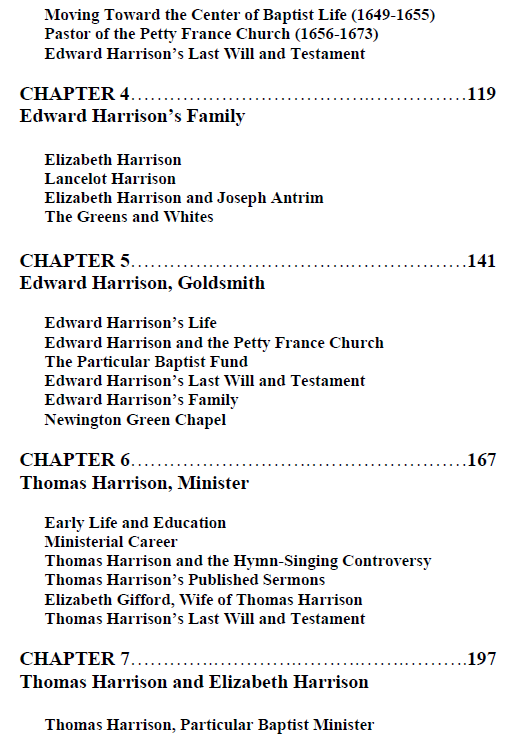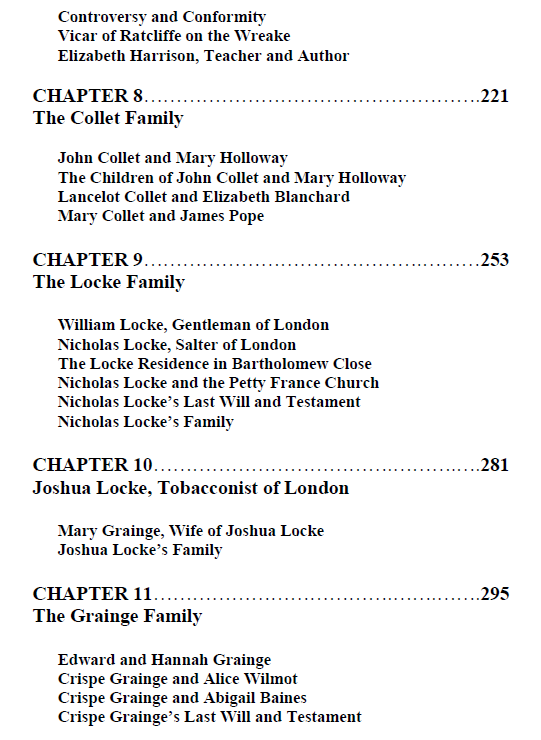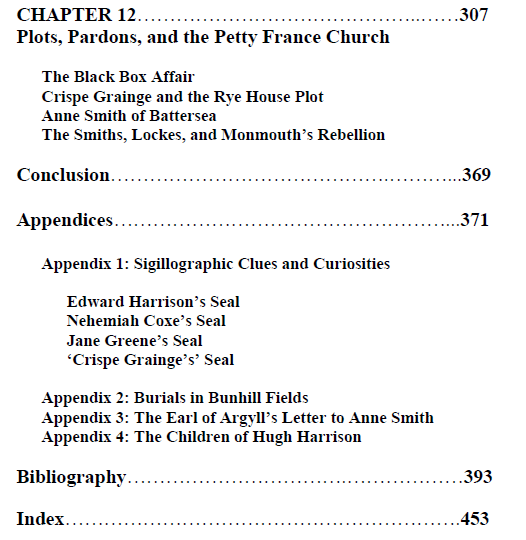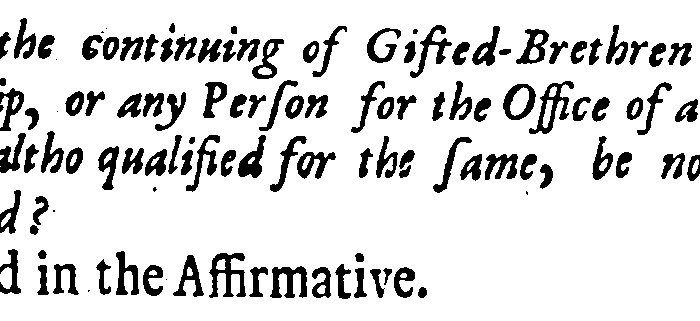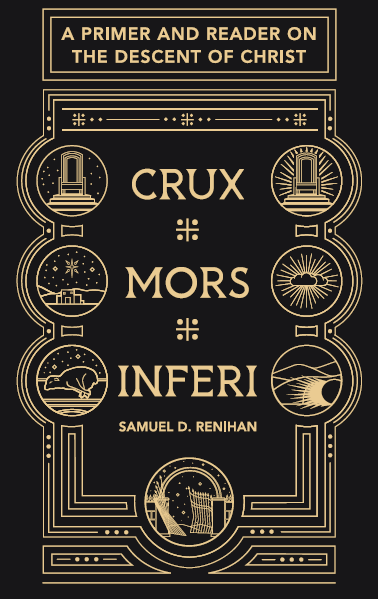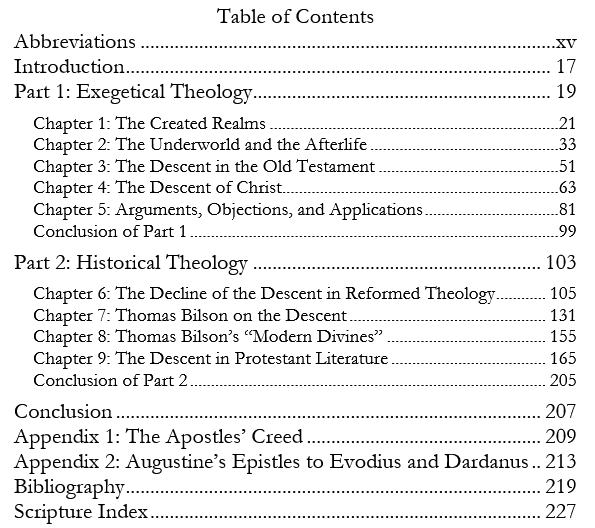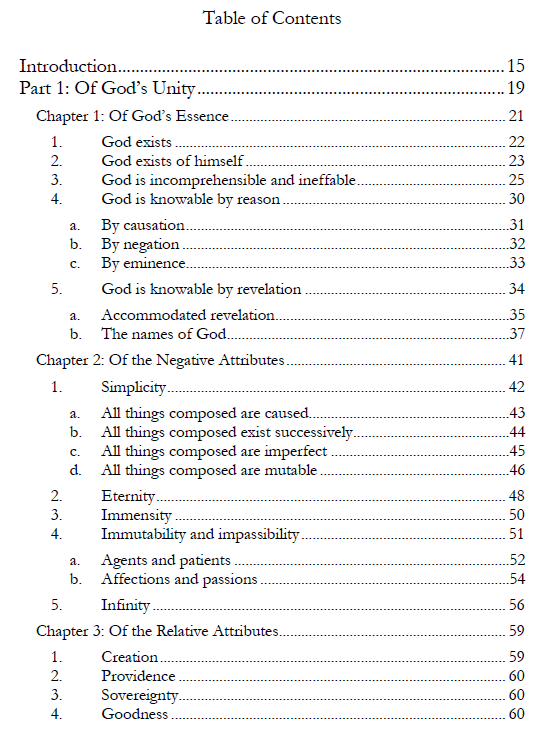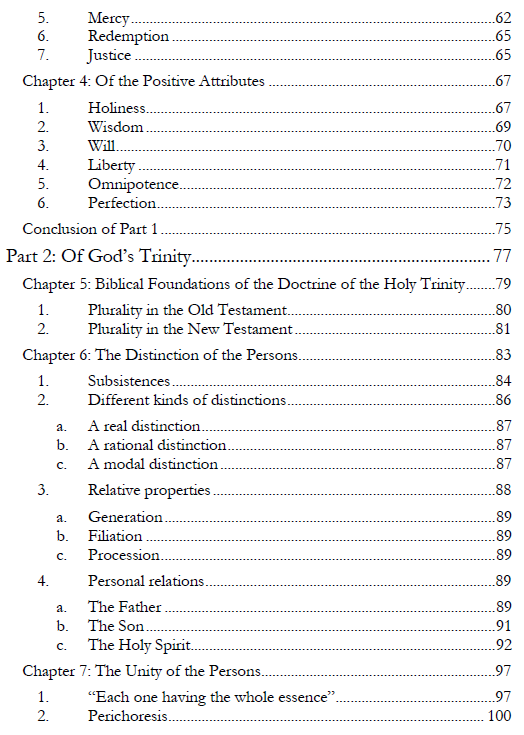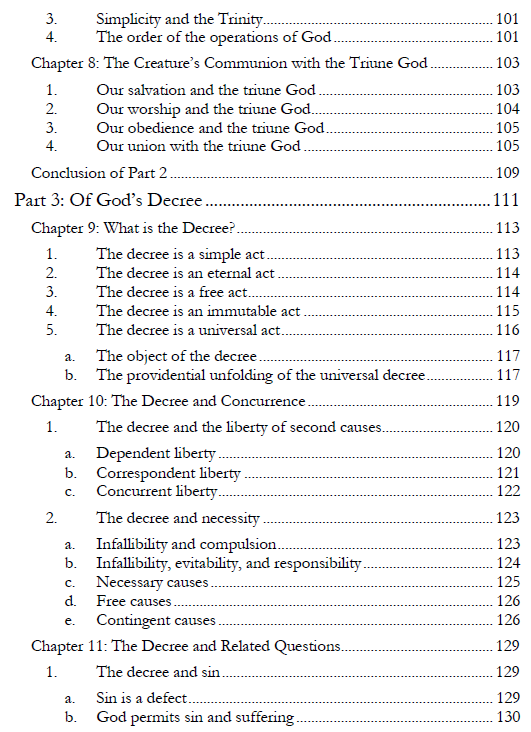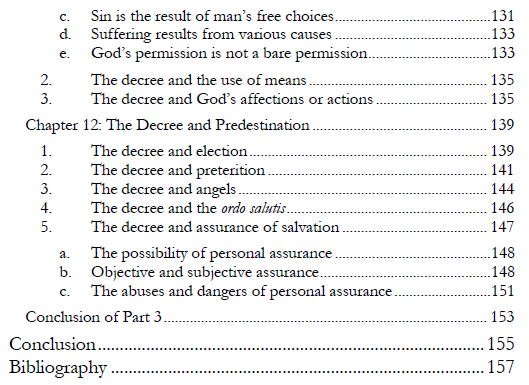Below are English-language quotations from seventeenth-century literature (and one from the late sixteenth century) where inseparable operations is mentioned. These authors use the common phrase (or a variant thereof) “opera trinitatis ad extra sunt indivisa” [the external works of the Trinity are undivided]. Of note is that this doctrine and its summary phrase are invoked regularly with little comment other than that it is a common received rule drawn from Scripture and taught by the church fathers (Augustine) and the medieval scholastics (the schoolmen). In a few cases, the author explains in more detail that though the outward works are common to the Father, Son, and Holy Spirit, certain works are attributed, ascribed, or appropriated to certain persons in a way that reflects their particular manner of subsisting.
The following sources are presented in chronological order of publication, though in a few cases the book is a later edition, meaning that the source material is older than the date of that edition’s publication. These are the results of one quick search I made yesterday. Based on that one search, it is evident that with more time and effort, many similar sources could be added.
To present the material as clearly as possible, I have updated much of the spelling without changing the words themselves. I have also moved a few marginal notes into the text itself (since there are no marginal notes in a blog post). I have included screenshots of the original text if you prefer to read from the sources themselves (which is always best).
- William Burton, Certaine Qvuestions and Answeres, concerning the knowledge of God (London: John Windet, 1591), 14v.
Q. How else are they all one?
A. In operation: that is, they all work one and the same thing together, as appears by these places: John 5:17; Genesis 1:26.
To this doctrine do the learned also give testimony: for one says, Opera trinitatis sunt inseperabilia: id est, the works of the Trinity be inseparable: which he [Wolfgang Musculus in his Common Places] explains by this similitude. Quum dicimus solem nutrire, & illuminare terram, non excipimus eius ardorem, neque splendorem, sine quibus non nutrit, nec illuminat:that is, when we say that sun doth nourish, & lighten the earth, we do not except his heat, nor his brightness: even so of the works of the Trinity.
Another, [Lambert Daneau in his Physica Christiana] says thus: Quia Deus est essentia unus, hypostasi vero trinus, sic intelligitur, ut opus hoc creationis sit illius trinitatis commune, quanquam in eodem opere sit distincta cuiusque personae operatio. that is: Because God is one in essence, but three in substance we must understand that this work of our creation is a common work of the Trinity, although in the same work there is a distinct & divers operation of each person.
2. Thomas Taylor, Iaphets First Publique Perswasion into Sems Tents (Cambridge: Cantrell Legge, 1612), 156-157.
Objection. But Christ raised himself, John 2.19. Destroy this Temple and in three days I will raise it again: and hereby was he mightily declared to be the Son of God by raising himself from the dead, Rom. 1.14. In like manner is this resurrection of his ascribed to the Holy Ghost, Rom. 8.11. If the spirit of him which raised up Christ, &c. therefore the Father raised him not.
Answer. Here is no contrariety, the Father raised him, and he raised himself. For 1. there is but one deity of the Father, Son, and holy Ghost, which is the common foundation of all their actions. 2. There is but one power common to them all three, and this is the power that Christ challenges he has to lay down his life and take it up again. 3. There is but one common act in them all three, opera ad extra communia tribus personis [the outward works are common to the three persons] for the putting out of this power unto any external action without themselves; of which Christ speaking, John 5.19. says, whatsoever the Father does, the same things does the Son also. In these respects holds the speech of the Apostle, These three are one, that is, these three, 1. in the true and real distinction of their persons: 2. in their inward proprieties, as to beget, to be begotten, and proceed: and 3. in their several offices one to another, as to send, and to be sent: these three are one in nature and essence, one in power & will, and one in the act of producing all such actions, as without themselves any of them is said to perform.
Secondly, although here is no contrariety, yet here is an order in the working or administration of the person to be observed: for the Father as the first efficient in order, raises Christ as man, by the Son as a second efficient in order, and by the holy Ghost as a third. For as it is in all the matter of creation, so is it in all the works of redemption: they are ascribed unto the Father especially; not because they agree not unto the other two persons, but because he after a peculiar manner works them, namely by the Son, and by the holy Ghost; but they not by him, but from him: and so neither this, or any other such place, where it is ascribed to the Father to raise his Son Jesus, must be conceived, either as making Christ (as the Son) inferior in power to his Father, or as excluding his own mighty power in raising himself; for they show only the order of the persons, but make no inequality in essence, or power, or will, or working.
3. John Yates, A Modell of Divinitie (London: John Legatt, 1623), 109-110.
Q. What do you observe concerning Elohim, or the persons?
A. Two things, their cooperation, and distinct manner of working, the one is necessary in regard of this, that they have the same essence, and therefore cannot but co-work in every thing, the other is likewise as necessary, because each person has his distinct manner of subsisting. All operation flows from their essence, cooperation from their unity in it, and distinct manner, from the distinct manner of their subsisting. One essence, one operation, and three being one, must needs work inseparably, and one being three, must needs work in a distinct manner. Gen. 1.1. In the beginning Elohim made. Gen. 2.26. Let vs make. Mat. 12.31. Blasphemy is aggravated in regard of the three persons, and against the last it is made unpardonable, because a sin against the Father is remitted by the action of the Son, who redeems from wrath: and so is a sin against the Son by the work of the Spirit, who applies the merits of Christ to every guilty soul: but if the sin be against the holy Ghost, all hope is cut off; for there is no fourth person to help, and the work cannot go backward; for, the Spirit works neither by the Father, nor the Son, and so no means of remission is left for this sin.
Q. What is the divine co-operation?
A. Whereby the three persons work the same thing inseparably. John 5:17, 19, 21. My father works hitherto, and I work, whatsoever things he does, the same do I, he raises and quickens the dead, even so do I quicken whom I will, &c. John 1:3. Nothing was made without the son. And here we are to understand the same of the blessed Spirit.
Q. What is hence to be learned?
A. That all the persons work of themselves. 1 John 5:7. Three bear record, and yet they are all one in essence, in respect whereof they work from themselves. To be and to act is all one in God, therefore as each person is God of himself, so does he work of himself.
Q. What will further follow from this?
A. That there is no preeminence, or dignity in this their co-working. For as they are equal in essence, so are they equal in their actions. John 14:1. Ye believe in God, believe also in me. John 16:15. All things that the father has are mine. John 5:18. It was no sin for Christ to make himself equal with his father in every work. The same is as true of the Spirit.
Q. What is the distinct manner of working? A. Whereby each person works according to the manner of his subsisting. Hence it comes to pass, that the second person being mentioned with the first, it is said, Not of him, but by him were things made: for as the son works from the father, so the father works by the son. John 1:3. Col. 1:16, 17. Heb. 1:2. The like is to be understood of the Spirit, who being from both, has both to work by him. John 16:13. and does nothing of himself, (I mean) as a person.
4. George Walker, The History of Creation (London: John Bartlet, 1641), 5-7.
The second branch in this description comprehends in it the Author of these works, to wit, the Lord God Jehovah, that one infinite, eternal God and three Persons, Father, Son and Holy Ghost: This Branch doth distinguish these works. First, from the works of creatures which are proper to them. Secondly, from the personal operations of God as the eternal begetting of the Son which is proper to the Father and is his work only. That God considered in the unity of his essence as he comprehends all the three Persons, is the Author of these works, and that they are common to the Father, Son and Holy Ghost, and every one of them has an hand in every work of this kind; though one more immediately than another: The word Jehovah here used in the Text doth plainly shew, where it is said, Whatsoever Jehovah pleased or was willing to do, that he hath done: which word is so proper to God, and signifies One God, that it also agrees to every person in that one God. And this is also confirmed by divers other testimonies of God’s word, which shew that in divers of these outward actions or works, the Father works by the Son and the Son by the Father with and by the Spirit. The first great work of this kind, even the work of Creation, which sometimes is attributed to the Father as more peculiar to him, because terminatur in Patre, as the Schoolmen speak, that is, it is bounded and termined in the Father, and he is principium & summus terminus creationis, the first beginning and utmost bound of creation, from whom it first proceeded, even this is attributed to the Son and Spirit also, as being common to all the Persons, as Psal. 33. 6. By the word of the Lord (that is the Son) were the Heavens made and all the host of them by the Spirit of his mouth. To which add, Job 33. 4. The Spirit of God made me, & John 1. 3, 10. & Colos. 1. 16. where it is said, that by the eternal word the Son all things were made both in Heaven and Earth, visible and invisible, and without him was made nothing of all that was made. So likewise in that outward work of Judgement executed on Sodom and Gomorrah, Gen. 19. 24. Jehovah is said to rain down from Jehovah out of Heaven fire and brimstone, that is Jehovah the Son from Jehovah the Father, who are both one and the same God Jehovah; yea that these external works of God are not divided some to one Person and some to another in the Trinity, but are common to all the Persons and proceed from that one common essence, according to that saying of the School-men, opera Trinitatis ad extra sunt indivisa [the outward works of the Trinity are undivided]. Our Savior shows most plainly, John5. 19, 22. where he says, that as the Son cannot work of himself alone without the Father, but he must have and see the Father working with him, so the Father does not judge any, that is by his own proper act of judgment, but hath committed all judgment to the Son, that he may have a hand in all judgements together with himself, and John 16. 13, 14. speaking of that special illumination of men’s hearts and inward teaching which seems most proper to the Spirit, he says it is not of himself alone, but it is what he has heard and received from the Father and the Son, And therefore the second Branch is manifest that the doer of the outward works of God is Jehovah our God, and all the three Persons in God.
5. David Dickson, A Brief Exposition of the Evangel of Jesus Christ, According to Matthew (Glasgow: George Anderson, 1647), 5.
Then he discharges Joseph’s suspicion which he had of Mary, assuring him, that that which is conceived of her, is of the holy Ghost, and this he says not to seclude the operation of the Father and the Son, whose work is always one with the work of the Holy-Spirit, by whom the Father and the Son do work, whatsoever they work among the creatures, being all three one God, as undivided in essence, so inseparable in operation: But this work is attributed to the holy Ghost, to seclude the ordinary way of generation of man.
6. Nicholas Byfield, An Exposition upon the Epistle to the Colossians (London: Miles Flesher, 1649), 114. 4th Edition.
Thus of Creation in general: the second thing is, who is Creator.
In him, or by him. The whole Trinity did create the world; because it is a rule, Opera ad extra sunt indivisa, that the works of God that are without, are undivided; so as that which one Person does, all the three Persons do. yet there is difference in the Order: for the Father moves and wills it, the Son works it, and the holy Ghost finishes it. Creation is given to the Father, Acts 17.24. to the Son, John 1.3. to the holy Ghost Gen. 1.2. Psal. 33.6.
7. Francis Cheynell, The Divine Trinunity of the Father (London: T.R., 1650), 51-52.
When the term Only, or any the like term is applied to the Divine nature, or to any Divine[1]Title, Attribute, or Work,[2]the Father, Son and Holy Ghost being one in nature, cannot be divided or separated by that exclusive term, though there is a personal difference between them, and a special order and dispensation to be observed amongst them, as we shall hereafter prove. But the intent of the Holy Ghost is to exclude all that are not Gods by nature, as the Apostle speaks, Gal. 4. 8. from the Godhead, and from laying any claim to the natural Attributes of God, or pretending to do any work that is proper and peculiar to God. The true and living God is opposed to Idols, 1 Thes. 1, 9. But Jesus Christ and the Holy Ghost are to be acknowledged and served as one true and living God with the Father. The living God, the God of truth, and King of eternity, is opposed to those counterfeit Gods, Jer 10, 11, 12. And therefore when the Apostle saith There is no other God but one, 1 Cor. 8 4. He tells you whom he doth exclude, such as are but conceited gods, so called and so reputed, equivocal gods, v. 5, 6. The Lord Jesus and the Holy Ghost are God by nature, the same God with the Father, and therefore they are not excluded. In like manner, when it is said that Jehovah alone did lead the people in the wilderness, and conduct them unto Canaan, that exclusive particle is put to exclude strange gods, such as were then idolized, but were indeed no Gods, as is most evident, Deut. 32. 12. So Jehovah alone did lead him, and there was no strange god with him: but these strange gods who are here excluded, were no gods, as is clear by comparing the 16. and 21. verses of the same Chapter.
[1]See Augustine, De Praedestinatione Sanctorum, Cap. 8.
[2] Omnia trinitatis opera ad extra sunt inseparabilia. [All the outward works of the Trinity are inseparable.]
8. Nicholas Estwick, Mr. Bidle’s Confession of Faith, Touching the Holy Trinity…Examined and Confuted (London: Thomas Maxey, 1655), 208.
You add, “Had Christ been the eternal Son of God, he needed not the assistance of the Holy Ghost to furnish him with a humane nature, being himself able to produce it, unless you will say, his Divine nature was idle.”
I answer, all this is spoken both ignorantly and blasphemously, for the holy Ghost had no efficiency or causality in the incarnation of our blessed Savior, which was not common to the Trinity, for as Father, son and holy Ghost are inseparable, touching the Divine Essence and power of working, so likewise are they inseparable in their operations. The persons of the holy Trinity, have one absolute, entire Essence and existence, and therefore being one and the same God, it follows that their transient and outward actions in reference to the Creatures, are undivided and common to them all, as one formal Principle of them; albeit, I deny not that power by a phrase of speech, called by the Schoolmen appropriation, is ascribed to the Father, Wisdom to God’s Son, and holiness to the blessed Spirit, so that to speak properly, all the three persons, which are one essential and absolute God, blessed for ever, did without any peculiar efficiency to any one of them frame the human nature of Christ, though it was terminative (as they say) assumed only by the second person, which denotes the dependency of that human nature on the Divine Person, without any difference of causality betwixt them.
9. n.b. this portion from Estwick is quoted at length and cited approvingly in Isaac Marlow, A Treatise of the Holy Trinunity (London: n.p., 1690), 74-75.
10. George Hutcheson, An Exposition of the Gospel of Jesus Christ According to John (London: Ralph Smith, 1657), 70-71.
In taking up divine and supernatural mysteries, we are to submit unto, and acquiesce in divine revelation, what ever carnal reason suggest to the contrary; so much also doth his confirming this truth, and obviating all objections, with his asseveration, teach us. 5. As the Father and Son are one in nature and essence, so are they undivided and inseparable in operation and working, and the Son works only what the Father works; for, the Son can do nothing of himself, (or separate from the Father) but what the Father does; and that he cannot work otherwise, but in conjunction with the Father, does not argue any impotency in him, but his strait union with the Father. 6. Albeit the Father and Son be one in essence and operation, yet are they distinct persons, and there is an order of subsistence and operation to be observed betwixt the Father and the Son; So much are we taught, in that the one is the Son, the other; the Father, and so distinct each from other, and in that the Son does nothing of himself, which does not seclude Christ’s own proper power as God, but holds out (beside his conjunction with the Father) that in order of working, he works from the Father.
11. John Owen, Of Communion with God The Father, Sonne, and Holy Ghost, Each Person Distinctly (Oxford: A. Lichfield, 1657), 15.
When I assign any thing as peculiar, wherein we distinctly hold Communion with any person, I do not exclude the other persons from Communion with the soul in the very same thing. Only this I say, principally, immediately and by the way of eminency, we have in such a thing, or in such a way Communion with some one Person; and therein with the others. Opera ad extra sunt indivisa [the outward works are undivided].
12. William Nicholson, Ekthesis Pisteos: Or an Exposition of the Apostles Creed (London: William Leake, 1661), 93.
The Opera ad extra, or the works which from the Unity issue as it were in open sight, are all in common works of the Deity. The first is that wonderful work of the Creation, which is attributed to all three persons. Elohim creavit. This the Creed attributes to the Father. But this also is attributed to the Son Isa. 54.5. Thy Maker is thy husband. The same to the Holy Ghost, Job 33.4. The Spirit of the Lord hath made. The second work is Redemption, is attributed to the Son. The third of Sanctification, which is a work of the Holy Ghost, and yet all three are the works of one true God, and of God alone, and therefore there can be but one God.
13. Anthony Burgess, An Expository Comment, Doctrinal, Controversial and Practical Upon the whole First Chapter of the Second Epistle of St Paul to the Corinthians (London: A.M., 1661), 148.
The holy Ghost from this word is called παράκλητος, the Comforter. So that although by way of oeconomy it is attributed to him in an appropriated manner, yet that does not exclude the Father. For opera ad extra sunt indivisa, but (as was formerly said) this fountain does not need any stone to be removed from it, and therefore we may immediately drink of it.
14. William Strong, A Discourse of the Two Covenants (London: J.M., 1678), 257, 303.
That all the persons have a special hand in the salvation of a sinner, and that by these promises every believer hath an interest in them all, in reference unto these works, opera extra sunt indivisa [the external works are undivided]. It’s true, they having one and the same nature and essence, what the one of them does, the other does also; whatever thing the Father does, the same thing does the Son likewise: But yet though these be not opera propria, proper works, yet they are appropriata, appropriate. There are peculiar works attributed unto each person, as 1 Pet. 1.2. Elect according to the foreknowledge of God the Father through the sanctification of the Spirit, and the sprinkling of the blood of Jesus Christ. Now suitable to these appropriated works, so should a man’s faith eye each of the persons, and his interest in them.
Page 303
It will appear by these distinct acts of office which they have for the good of the Saints undertaken; for though opera ad extra sunt indivisa [the external works are undivided], and we cannot say that one works, but the other works also; and therefore we cannot call them opera propria, proper works; yet they are appropriata, appropriated, in the Scripture they are more specially attributed some unto one, and some to another. Eph. 1.2, 3. Blessed be God the Father of our Lord Jesus Christ, who has chosen us in him before the foundation of the world, and blessed us with all spiritual mercies in Christ: and for Christ, we have Redemption through his blood, &c. and as for the Spirit, Eph. 1.13, 14. After you believed you were sealed with the holy Spirit of promise, who is the earnest of your inheritance. And so 1 Pet. 1.2. Elect according to the fore-knowledge of God, through the sanctification of the Spirit, and the sprinkling of the blood of Jesus Christ.
15. Edward Polhill, Christus in Corde: Or, The Mystical Union Between Christ and Believers (London: A.M., 1680), 187-188.
The next thing, which comes to be considered in this discourse, is the Operations of the Spirit. I touched upon this before, but now I will speak a little more to it. It’s true, these Operations, being among the opera ad extra, are common to the whole Trinity, yet in Scripture they are in a peculiar manner attributed to the Spirit; the reason of which is, because of that order which is among the persons in the Sacred Trinity: the Father is of himself, fons Deitatis, the fountain of the Deity; the Son is from the Father, lumen de lumine, light of light; the Holy Spirit is from the Father and the Son; he proceeds by an eternal spiration from both of them. And as is the order of subsisting, so is the order of operating; the Father operates from himself; the Son from the Father; the Holy Spirit from both: Hence in the three great Works of God; Creation, which is the first rise of things out of nothing, is in a special manner attributed to the Father. Redemption, which helps up a poor fallen creature, is in a special manner attributed to the Son. Sanctification, which perfects the redeemed, is in a special manner attributed to the Holy Spirit. Hence in the great Work of Salvation; the Father laid the counsel and platform of it; the Son carries on the work in a middle mediating way; the Holy Spirit, according to his place, in order consummates it by working Faith, and all other Graces: But this is only by the way. In treating of these Operations, I shall note two things; that is, what is in them of respect to union with Christ, and what is in them of respect to the Inhabitation of the Spirit; or, which is all one, to the Inhabitation of the whole Sacred Trinity.
16. William Burkitt, Expository Notes, with Practical Observations on the Four Holy Evangelists (London: R.J., 1700). Commenting on John 5:18.
Our Savior’s first Argument to prove himself equal with the Father in Essence and Nature is this, That the Father and he are equal in Operation, in Will and Consent for Working; that the Son does all that the Father does, and the Father does nothing without the Son, v. 19. The Son can do nothing of himself; that is, as Man, as the Messiah; and as Mediator, he could do nothing of himself. His perfect Obedience to, and Compliance with, the Will of his Father that sent him, would not suffer him to do any thing without him: But as God, he could do all things of himself. Learn hence, That it is an undeniable Proof that the Father and Son are one in Nature, Essence and Being, in that they are inseparable and undivided in Operation and Working; What things soever the Father doth, these also doth the Son likewise; and the Son doth nothing of himself, but what he sees the Father do: Therefore Father and Son being equal in Operation and Working, are equal in Nature and Being; and consequently both essentially truly and really God. Therefore the Arians of old, and the Socinians at this Day are wide, when they produce this Text, The Son can do nothing of himself, to prove that Christ is not equal with God the Father. They forget or neglect to distinguish betwixt his Divine Nature, which could do all things, and his Mediatorial Office, which could not do, but what the Father that sent him, had appointed him to do.
